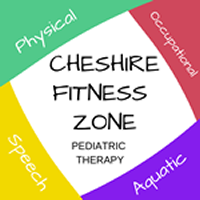Happy 2024 from the CFZ Family!
As we embark on a new year, let’s take the time to set positive intentions for the year ahead! There are many ways to encourage growth and development in a fun and age-appropriate manner for kids!
Encourage a Love for Learning
Encourage your child’s curiosity by setting a goal to explore new interests. This could involve introducing them to a new sensory activity, engaging in fine motor skill exercises, or incorporating speech and language activities into daily conversations.
Activity: Create a curiosity jar where you and your child can drop notes about topics they want to learn more about as they ask questions each day. Each week, pick a note from the jar and explore that subject together.
To help kids explore these topics, create a themed sensory bin for the weekly topic. Get a corresponding book from the library to read aloud, or play a YouTube video while the child explores the bin. Discuss the topic as kids play and explore; and prompt them to ask questions.
Why it’s good for pediatric development: This activity stimulates cognitive development by promoting exploration and curiosity. Themed sensory bins help with sensory stimulation, and allow them to better engage with the topic as they discuss and learn!
Take in New Forms of Media
Expand on what types of literature and media you are exposing your child to. Typical kids’ books are great for children. However, don’t hesitate to read or listen to topics and media above their reading level; if the content is deemed appropriate.
Activity: Read different media and genres such as news articles and books. Allow kids to choose appropriate topics at the library, and read it aloud daily. You can foster conversations about the content and explain new topics and words as you read.
There are also many free podcasts, read aloud YouTube videos, and radio stations that kids can listen to with you. Make sure to discuss what you are hearing and prompt the child to ask questions on the topic.
Why it’s good for pediatric development: Exposing your child to different forms of media and content enhances their vocabulary and general understanding of different topics.
Practice Gratitude Together
Promote emotional well-being through gratitude activities. Use a gratitude journal to also document progress and celebrate achievements and milestones.
Activity: Craft a family gratitude tree on a piece of construction paper, integrating sensory elements such as different textures for leaves. Each family member writes something they’re thankful for, fostering positive emotions.
Prompt children with questions such as, “what made you happy today?”, “what is your favorite thing”? Explain why it is important to appreciate things that make them happy and that they enjoy.
Display the art somewhere where kids can see it daily, like on a fridge. Families can add to the tree as they reach new milestones and times they feel appreciative. Prompt children to think about things each day after school or therapy that were positive, helping them think about things that they can appreciate.
Why it’s good for pediatric development: Expressing gratitude promotes emotional resilience and communication skills. It can also help kids recognize their own progress and milestones that they make at therapy or during the school year.
Nurture Emotional Intelligence
Enhance emotional expression by engaging in activities that foster emotional intelligence. A “Feelings Journal” becomes a valuable tool for both therapeutic discussions and tracking emotional progress.
Activity: Introduce a feelings journal, such as drawing or writing about daily experiences, helping your child connect with and express their emotions more effectively. Prompt kids to draw or write how they feel, and discuss what they are feeling and why they may feel this way. This can be happy, sad, excited, angry and other emotions. Help the child figure out why they may feel a certain way and how they can regulate their emotions better.
Why it’s good for pediatric development: Emotional intelligence is vital for children. This activity provides a structured way to explore and express emotions, aiding in their emotional development.
Foster Emotional Regulation
For the new year, encourage the child to make an emotional regulation goal. When your child is feeling upset or angry, introduce new ways to emotionally regulate.
Our Occupational Therapists suggest deep breathing exercises and taking a break. At home, you can create a “cozy corner” in a room in the house they feel comfortable in. The corner can have soft pillows, and sensory objects that kids can refer to cool down.
Why it’s good for pediatric development: Learning emotional regulation is important for kids as they face daily challenges. Kids will become more independent learning how to cool down from different emotions throughout the day.
Foster Independence
Set achievable goals for independence, integrating exercises that support your child’s specific developmental needs. Celebrate milestones in therapy and personal accomplishments to enhance self-confidence.
Activity: Create a “Responsibility Chart” to include daily tasks, making progress visible and reinforcing the connection between goals and achieving personal milestones. This can include helping to pack their lunch or snacks, learning to put away their laundry, help clean up after dinner, and other small tasks that can help support their independence.
As kids fill out their chart, introduce “prizes” on a regular basis. For example, for every 7 tasks that are completed, they get to watch a movie of their choice, or go to the playground for an hour.
Why it’s good for pediatric development: Independence is a key developmental goal. This activity promotes confidence, fine and gross motor skills, and a sense of accomplishment as they achieve milestones.
Happy 2024!
As we think about all the possibilities for the new year, let’s approach goal-setting for our children to enhance pediatric development!
Here is to a year filled with growth, learning, and joyful moments for your family!



